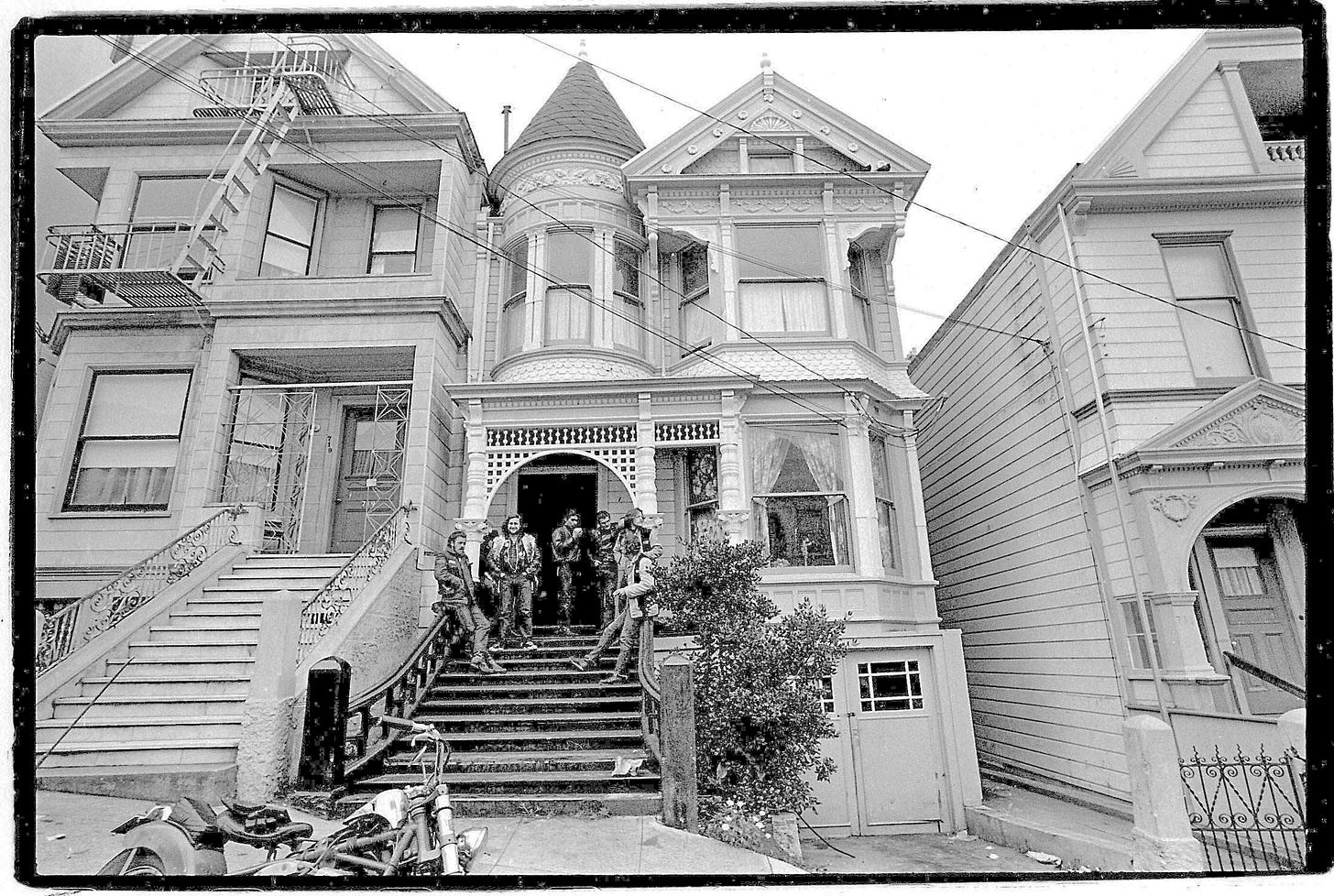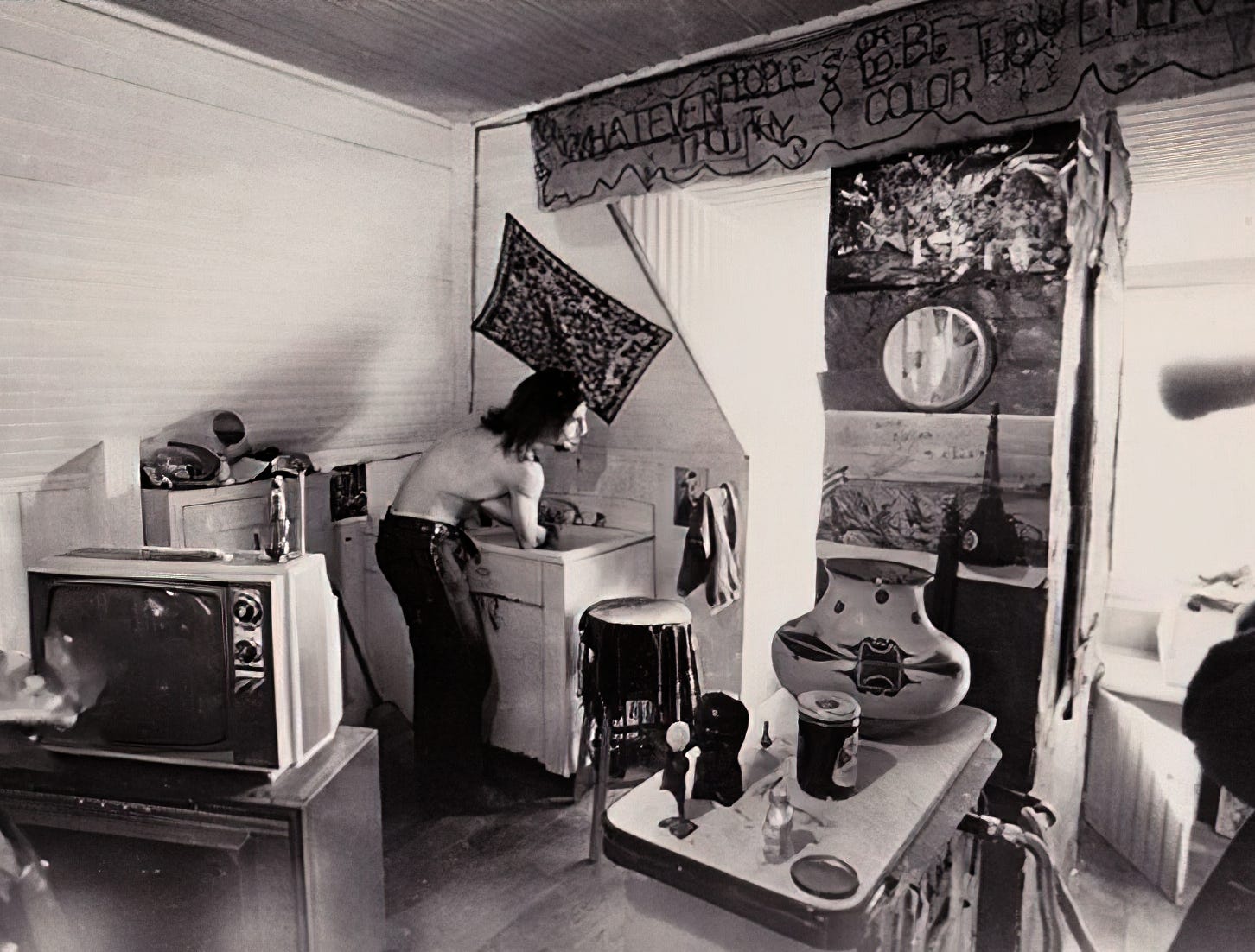My few days filming the San Francisco Hells Angels
In 1970, Sweet William showed up at my North Beach studio....
This story is about a few intermittent days I spent with the Angels, but it’s mostly about Sweet William Fritsch, who for a while, was Vice President of the San Francisco Chapter.
In 1970, Sweet William showed up at my North Beach studio one day with two other Angels, Freewheelin’ Frank and Frisco Larry. He explained that they wanted to make a film about their chapter. All the Hollywood biker films that were coming out, he said, were portraying bikers and, by extension all Angels, falsely. They wanted something more truthful. They wanted to tell their own story. They were told I would be good at that.
For a while the three walked around my studio, looking at cameras, picking up lenses, examining editing machines. Just, I imagined, to see how I would react. I put on my best stoic self. Normally, I might have been intimidated by this, but Fritsch somehow projected a trustworthy honesty not normally associated with Hells Angels.
Their idea was for each Angel in the chapter to have 15 minutes of film time. An Andy Warhol moment. Each could choose what he wanted to do: Ride his Harley, some routine activity or just talk on camera. Surprisingly to me, many chose the latter.
Sure, let’s go for it…
I had just bought Al Maysles’ camera with his name carved into the lens barrel. It was like having a baseball bat signed by Willie Mays. My friend Don McKinnon came out from Colorado to help. At the time, I was making film on the World Cup Skiing circuit so had to fit the Angels filming between.
Frisch was a crucial liaison to the Angels inner world.
The interview sessions went well. Bob Roberts, president, led off with an academic but honest statement of the Angels’ relationship to society in general:
“You are a Hells Angel 100%. A Hells Angel loses his race, his nationality when he joins the Hells Angels. Your race – if you’re a Mexican, Italian, Spanish, or Jew or what have you – you lose it. You become a Hells Angel and nothing else but a Hells Angel. If somebody was to insult your creed or your beliefs or your religion if you want to react…it’s up to you. But foremost over everything is that you are a Hells Angel. No way getting around it. Once you become a Hells angel you are a Hells Angel 100 percent. You can’t put anything else in front of us.”
Moose, a younger member, talked about pride and camaraderie, though his enthusiasm rose to a pitch when describing being outnumbered in a bar fight and when he called for support and several Angels arrived on bikes in short order and. “..we beat the hell out of them.”
The Angels were surprisingly open about allowing me to film them whatever they were doing, riding, in their own homes, hanging at local bars, a couple of fights. Jean Claude Killy, the French Olympic skier who I knew from my skiing days, was in town and curious. We took him see Pete Knell, an Angel who was building a Memorial Harley for an Angel’s funeral ceremony. Killy wanted a Harley for himself but it wasn’t possible.
There seemed to be a trust. It helped that I rode a motorcycle as well, albeit a Triumph 500, not the requisite Harley.
“Be careful though”, Bill told me one day “…there will be times when you’re around the Angel house, filming this, filming that, if there’s some drinking or drug use going on and someone asks you to drink or smoke or snort or whatever.. you can’t say ‘no I’m just here filming’. You can’t separate under excuse of journalistic detachment. If you’re around a scene you have to be willing to be a part of it. And… a couple of Angels don’t really want this film to be done, even though we all voted for it.. and so one of those guys might start to harass you. If they do, don’t expect any Angel to help you no matter how unfair the assault. That’s the Angel code, no judgment of fairness is ever made – it’s everyone on the side of the Angel. You may not see trouble coming. So, if I say ‘Paul, leave’. Don’t ask why, don’t ask what’s happening - just take all your shit and leave, leave right away.”
The Angels had Thanksgiving Dinner at their house on Clayton Street, just up from Haight. I was invited. Like many of these gatherings, not much was going on. Drinking was heavy. People moving from room to room. Loud. Suddenly Fritsch came up and said, “Now, leave”. I grabbed Don and we did. I never found out what the impending danger was, but I had that trust in Fritsch.
I left and later that night, after having ingested some substance, I rode my Triumph to Chet Helms’ Family Dog ballroom way out the Great Highway by the beach. The Grateful Dead were playing. It was a hallucinogenic evening. In the middle of the crowd I turned to confront, face to face, Emiel Vandenberg, my red bearded friend years ago at film school who I hadn’t seen in ten years. He grinned and without saying anything, he disappeared. It seemed unreal. The Dead played on for one of their fifteen minute choruses.
I thought of Hunter Thompson who I knew from Aspen, who had written the essential book on the Angels from his experience with them – ending with him getting beaten. But he had gone with the Oakland Angels, a much more aggressive and less tolerant group.
The San Francisco Angels were experimenting with inviting people from the Height Ashbury Beat / Hippie movement into their scene and vice versa. Many in the counter culture movement thought of them as their outlaw brothers. Janis Joplin was a regular. For once the Angels seemed to be influenced by an outside group.
I thought that Fritsch had a lot to do with that. He was a charismatic leader, he had been a partner in the Diggers, the radical San Francisco group then run by Peter Coyote, Emmet Grogan and others, that was collecting excess food from supermarkets and distributing it free in the park. 1 % free was their motto. And Bill was married to Lenore Kandell a major poet of the Beat scene.
I never learned why Sweet William made the transition to being a Hells Angel.
Tim Hodgdon in his essay on Two Countercultural Communities :
“Fritsch exemplified the swashbuckling persona of the Digger life-actor.
(Peter) Coyote describes the stir caused by "Sweet William's" introduction
to the Diggers at a meeting of the Artists' Liberation Front in May
1966. He arrived as the escort of Lenore Kandel. Dressed in matching
bright-blue leather pants, they "radiated the charisma and self-assurance
of natural leaders. Their style was effortless, authentic, royal…
Fritsch was an unknown. Yet, he was with her. Obscurity proved no bar to his
immediate recognition by Coyote as a heavy among heavies.
Other men noticed Fritsch and Kandel's entrance. Grogan attended the meeting,
…in Fritsch's bold manner, he seems to have recognized a kindred spirit,
someone who might become a valuable ally. Grogan befriended his potential
competitor, and it was in no small part due to Grogan's sponsorship that
Fritsch and Kandel became part of the Digger inner circle…
Coyote came to admire not only Fritsch's integrity and generosity, but also his
authenticity: he appeared never to hesitate to gratify his own desires, heedless of
the opinions of others. Not content to remain a leading light among the Diggers,
he joined the Hells Angels, probably in late 1967. His involvement in the club
led not only to his estrangement from the Diggers, but also to the eventual
dissolution of his relationship with Kandel.”
The Angels loved to play a fascination game. They would have a raucous but seemingly harmless party - on their turf – open to anyone. But when it got heavier than the outsiders were comfortable with, it was too late. No leaving now…
William talked to me about some land the Angels had bought up in Healdsburg, 60 miles to the north. It was land they said would be available to any Angel when they “retired”. We agreed it should be filmed. Another aspect of their lifestyle.
There was an upcoming Run to the Land, a group, of thirty or so Harleys side by side across the highway lanes. I wanted subjective imagery, not an outside view. So I rode on the back of Fritch’s Harley, facing backward. just tied to him with a rope, hand holding my Beaulieu camera while Bill rode in the midst of the pack of Harleys.
Paul filming from Sweet William’s Harley <photo Don McKinnon>
Shortly after that, the filming ended, much as I wanted to continue.
The Angels ran out of money for the project.
There was no structure, there were just fragments of a movie.
The Angels wanted the negative back.
Hanging out around Angels scene was always potentially dangerous, but it was a danger perpetrated with fists or a club. At most a knife. Now it was moving toward the occasional gun. It was time to leave
Of all that went down in those days it’s Bill Fritsch I remember most. Sweet William. Someone from a world so far from mine but someone to who I felt very close and who was as honest and open as anyone I’ve ever met. He was, in his own way, trying to bridge the gap between two disparate elements of our culture. He did, for a moment.













Amazing tale. What a story of diplomacy in a potentially volatile environment. They like you til they don’t.
I do not recall you expressing any interest in the motion picture medium when we hung out together and traveled to Virginia City and Baja California on CYCLE Magazine's dime. I was already making short experimental films which proved utterly unpopular with audiences. I started off with a Bolex H-16 that Lulu du Ulul, my first wife and movie starlet, called "Byron's alarm clock camera" because of the way that you wound up the spring. But my true loves were my Beaulieu R-16s, and your mention of the marque brought a smile to my lips. I still have my Beaulieus but they haven't run film through them for years. Arthur Cantrill said there's some European in Australia who could rebuild my two R-16s but that was over 30 years ago so the guy's probably dead by now. Nobody here in Jakarta is souping 16mm anyway these days, and as soon as I started shooting documentation in the narrow-gauge video medium I felt much more at home than I had with fillum (as the Canucks call it). Nice and credible story you shared; I thought about my time in the Bay area, and riding a four-hour road race at Vacaville with one Eric Dahlquist, who went on to murder a guy over a drug deal gone bad. You won't forget that family name, as Jon Dahlquist was a very popular automotive cartoonist.
I'm glad I'm on your mailing list, Paul. Hope you are holding up well.